He's a 'Beachneck:' Former Fletcher High coach and teacher a true friend of the beach
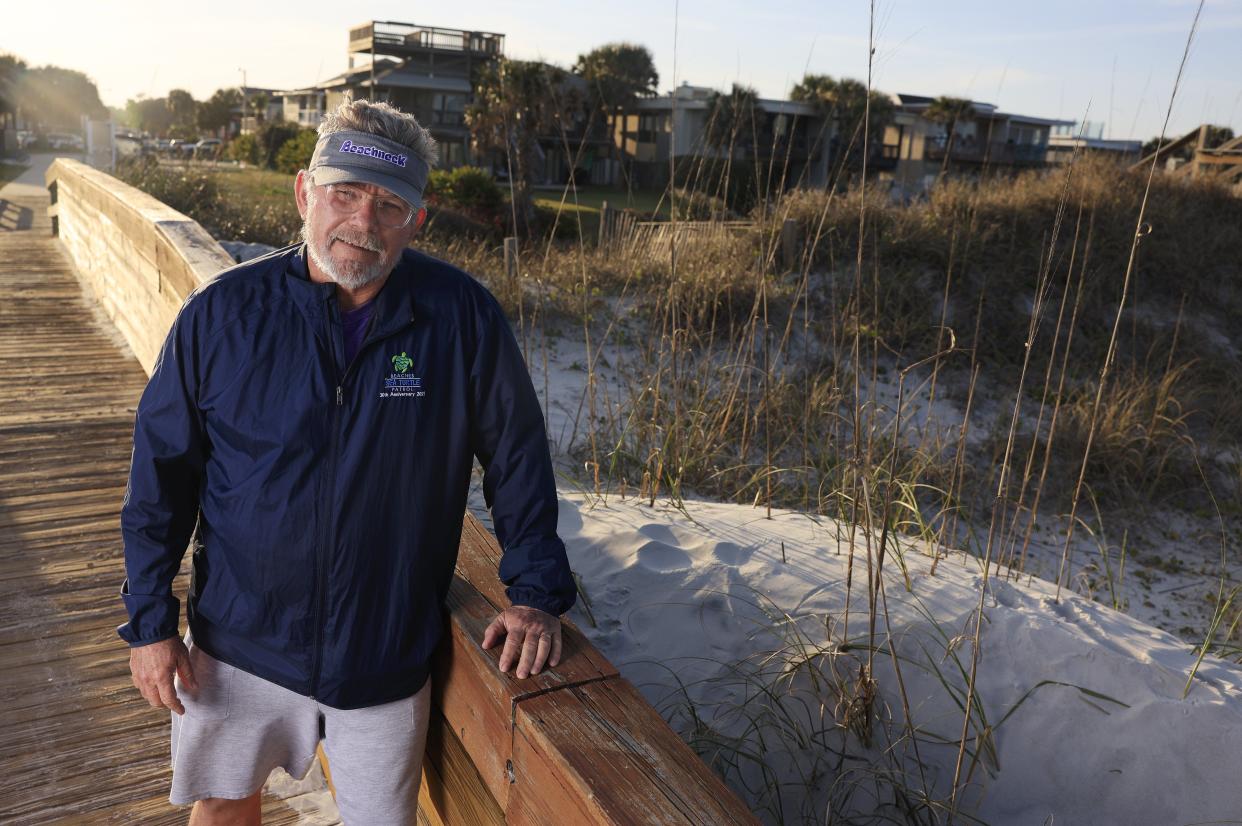
Kevin Brown is in his element, up on the Hopkins Street dune walkover in Neptune Beach, not far from where he coached football, baseball and soccer at Fletcher High School. It’s been another pretty day at the beach, and as the sunset turns the western sky pink and yellow he’s happily showing off a sand dune created by a former student, talking about the interconnectedness of all the sea oats that hold it together.
He’s given this talk, or one much like it, many hundreds of times, but he seems as thrilled as he must have been the first time around.
These sea-oat roots, he said, can be more than 20 feet long! They send out runners toward other roots, and when it rains, they share water with each other. Floating in the sea air is salt spray and tiny grains of sand, and when they fall they get caught in the dune, which builds it up, grain by grain.
That dune, girded by those mighty sea oats: It’s like a wall, he said, a wall protecting the Beaches where he’s spent almost all of his 63 years.
As Brown spoke, a few people nearby crouched low on the walkover, hiding from a young couple on the sand. They were there to film and witness a surprise marriage proposal, and soon a cheer went up when she said “Yes.”
Brown gave a little chuckle. He had asked his wife Brenda to marry him right below this very beach access, and years later his daughter Jamilah was proposed to there as well.
In a way, he’s like those sea oats he loves so much: His roots at the Beaches run that deep, that strong.
'Defend the island'
Kevin Brown — recently named 2024's "Friend of the Beaches" by Beaches Watch, a nonprofit focused on quality of life issues — grew up in Palm Valley between the Intracoastal and the beach before it became largely a western extension of pricey Ponte Vedra.
It was paradise for an outdoor-minded kid: He surfed, camped and fished, and his father taught him to appreciate the ecology of the woods and the ocean and marsh.
As a student at Fletcher High, the Beaches school, he played football and soccer and ran track, and when he went to Florida State University he became part of the football program. He never played a down, he stresses, but he was a manager and a trainer and a coaching assistant way down on the coaching totem pole.
He later joined the Jacksonville Bulls of the long-gone United States Football League as a lower-level coach while substitute teaching during the off-season at Fletcher. He went there full-time in 1985.
He spent some four decades at his alma mater as a student and teacher. “Way over half my life, I have been in that building," he said.
Brown coached sports and taught marine science and environmental science. Along with teachers Roger Wood and the late Gary Kirkland, he started the school's Marine Coastal Club, which became a place for generations of students to learn about and help protect their sandy home territory.
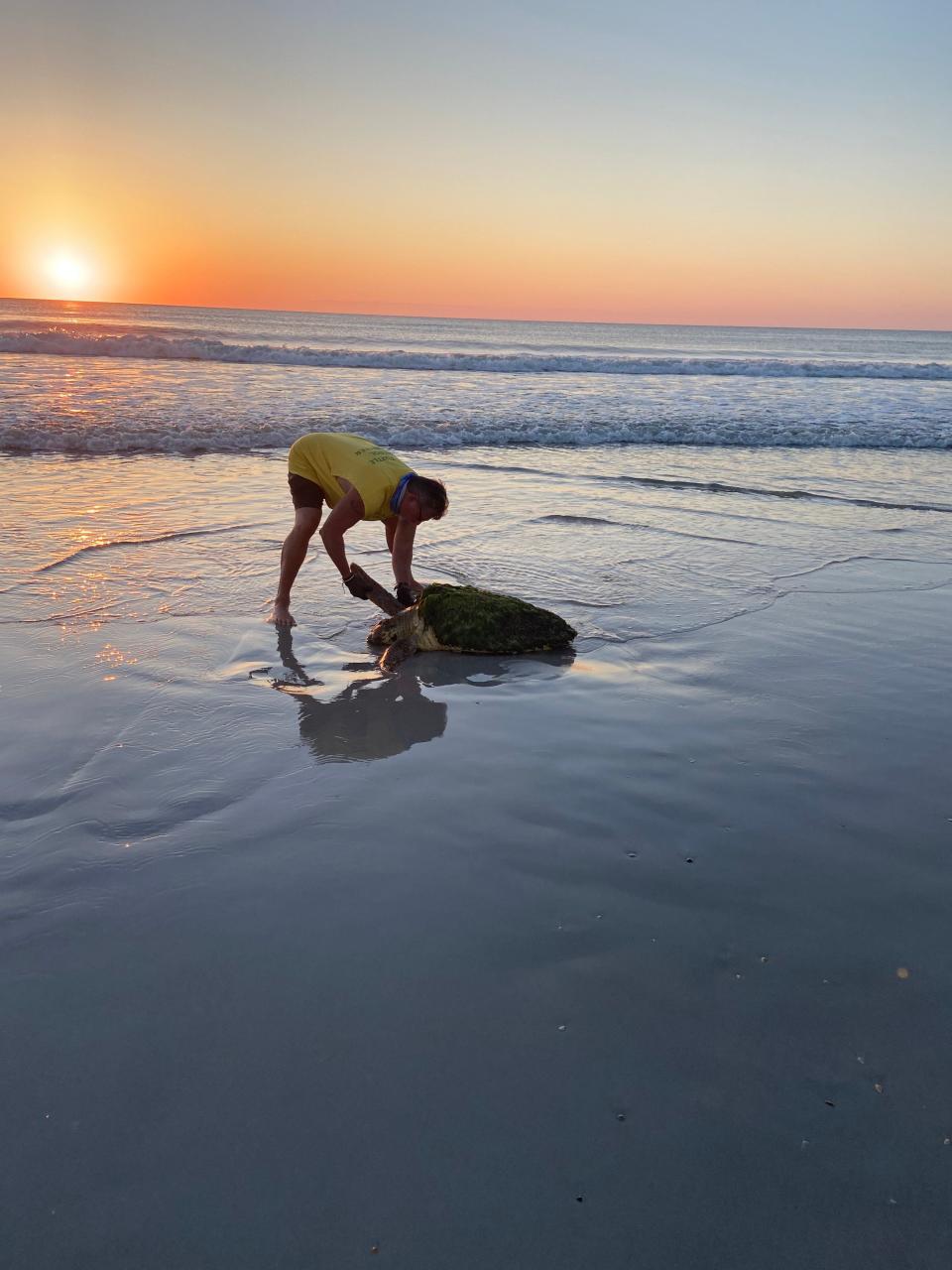
He'd often take them out of class and walk to the beach to check out how the dunes were holding up. He once taught a unit on sea oats, which included planting a few. That went well, he figured, so why not plant more? That led to many thousands of oats being planted, part of a community project far bigger than the early work of teacher and students.
On volunteer time, students attended city commission meetings and held fundraisers to buy more sea oats (an effort greatly helped after the Jacksonville Jaguars honored the club at halftime of a game). Students erected PVC pipes and strung ropes between them and put up signs advising people not to trample the dunes. When the sargassum washed up on the beach, students joined Brown in "The Great Rake," raking the seaweed up against the foot of dunes for extra protection. And among many other things, they participated in countless beach cleanups, picking up after careless beachgoers.
"As a teacher it was so rewarding when the kids responded, and they did," Brown said. "I could say, we’re going to do this on a Saturday, and 50 kids would show up, whether it was a cleanup or planting oats.”
His athletes pitched in too. He laughed, recalling how he enlisted the football team's entire offensive line to plant sea oats in Atlantic Beach. He told them he had a thousand sea oats, and that they were coming to help. They showed up.
Student volunteer efforts like that led to numerous citizens pitching in as well, along with help from the Beaches municipalities. It would be nothing without all the volunteers, he likes to stress.
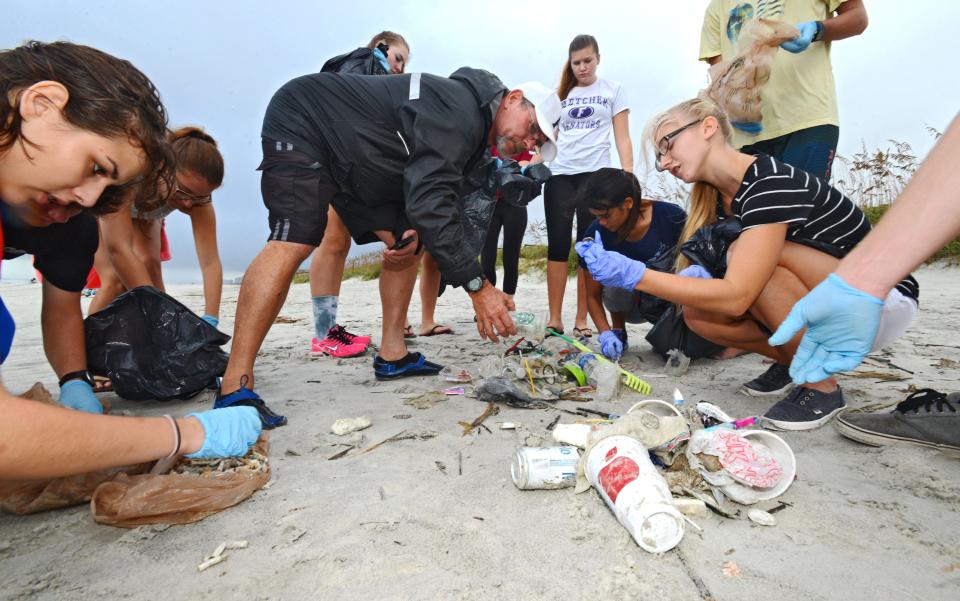
Many who participated were given a T-shirt of his own design, with the Marine Coastal Club logo on the back and the word "beachneck" on the front. What's a beachneck? He is.
“It’s a person who loves the beach. You‘re a conservationist, a preservationist person. That’s what a beachneck is. You don’t like to leave the island; you defend the island. We defend the island.”
Government beach renourishment efforts have been invaluable in doing just that, Brown said. Whatever people can do to help preserve and add to that work only makes it better. He notes that before Hurricane Matthew in 2016 and Hurricane Irma in 2017, the Beaches' dunes were 32 feet high. The storms flattened them. But they did what they were intended to do and, for the most part, prevented storm-driven water from roaring into neighborhoods.
The dunes aren't back to that yet, Brown said, but they're getting there.
Opening eyes and hearts
For Beaches Watch, giving that "Friend of the Beaches" award to Brown was an easy decision, said the group's president, Maria Mark. (He'll be recognized at the group's 20th-anniversary celebration from 6 to 8 p.m. Wednesday at Beach Diner in Atlantic Beach.)
"He's an icon at the beach. Everyone knows him, everyone knows how involved he is in this beach work," Mark said, noting his long involvement with the Beaches Sea Turtle Patrol as well as his time at Fletcher. "And being a coach, especially football, it expands that group of people who know him and brings in different perspectives."
He was a popular teacher, said former Fletcher student Gabby Craft, 19. She's now studying chemistry at Florida State, with help from a $1,000 scholarship that Kevin and Brenda Brown, who was also a Fletcher teacher, set up to help honor Brenda's parents, Fuad and Mary Batteh.
“I feel he really embodies the beach community spirit in terms of his willingness to help others," Craft said.
Grace Barnwell, 21, a University of North Florida graduate, lives in Neptune Beach and teaches second-grade math and science at Anchor Academy near Hanna Park.
She gives ample credit to Brown. “To be completely honest, I was not into science or math prior to being in his class, but he took my perspective and totally flipped it on its head.”
She remembers doing experiments in class on acid rain, erosion and climate change, as well as field trips to the beach and the Intracoastal Waterway marshes.
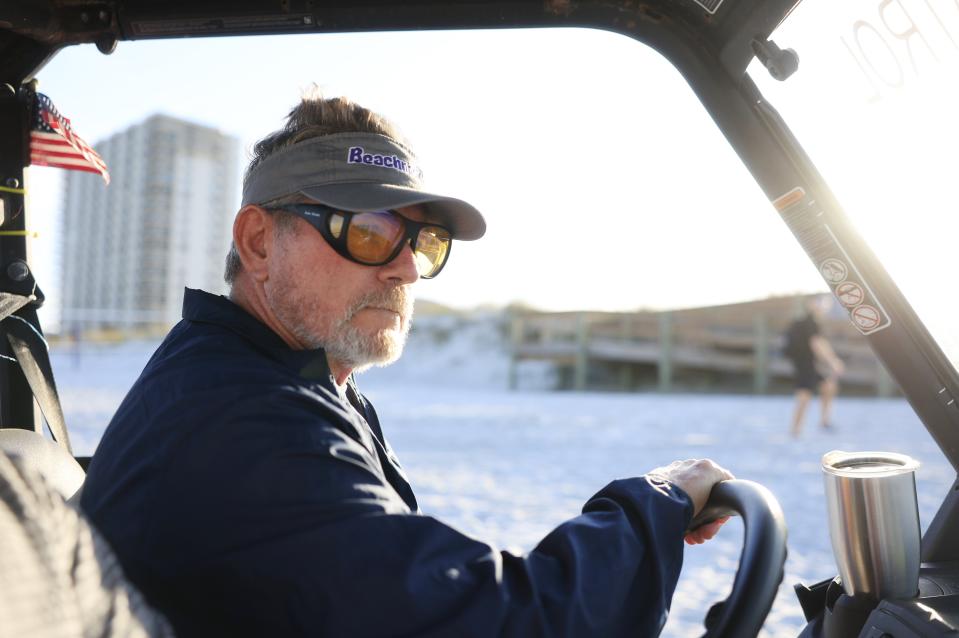
Brown gave students, many of whom had grown up together, a new way of looking at their home, she said. Consider that big tree they'd walked by 100 times, Brown would stop and tell them how it’s supporting an entire ecosystem. “It’s cool to have your eyes opened like that," she said.
A favorite memory of hers comes from 2021 when she was graduating and he was retiring. As students got ready to get their diplomas, Brown on stage made a familiar gesture toward them — twice pumping his fist against his heart, then throwing them a peace sign.
And out in the crowd, hundreds of students did the same, pumping fists against hearts, throwing peace signs right back at him.
Sharks and bait and turtles
Asked to wax philosophically about the beach he calls home, Brown goes ahead and does it, straight off, no note cards.
“There’s nothing like watching a sunrise coming up over those dunes and the sun hits it perfect," he said. "And you can see the green and brown color in the oats. It just tells me, when I see the dunes in great shape like that and people respecting it, I kind of know that Jax Beach, the Beaches, are going to be around for a while. I worry that one good storm season may do us in. I constantly pray against that. But with a good healthy dune system, I know the ecosystem is right. For example, people always say, ‘Why do we study sea turtles?’ My first comment to them is, ‘Look, these guys have been coming here for a long time. And if they keep coming back, our beach is in good shape, our water’s in good shape, and that tells me that all of our efforts, we’re doing the right thing.'”
It's important, he said, for those who are learning about the natural world to get out in that actual natural world. That's something he did with his students, all the time.
“Let's face it, all of them are from here, and all I think I did was opening their eyes to things we could make better," he said. "I always said that, man, what we want to do is leave it better than we found it.”
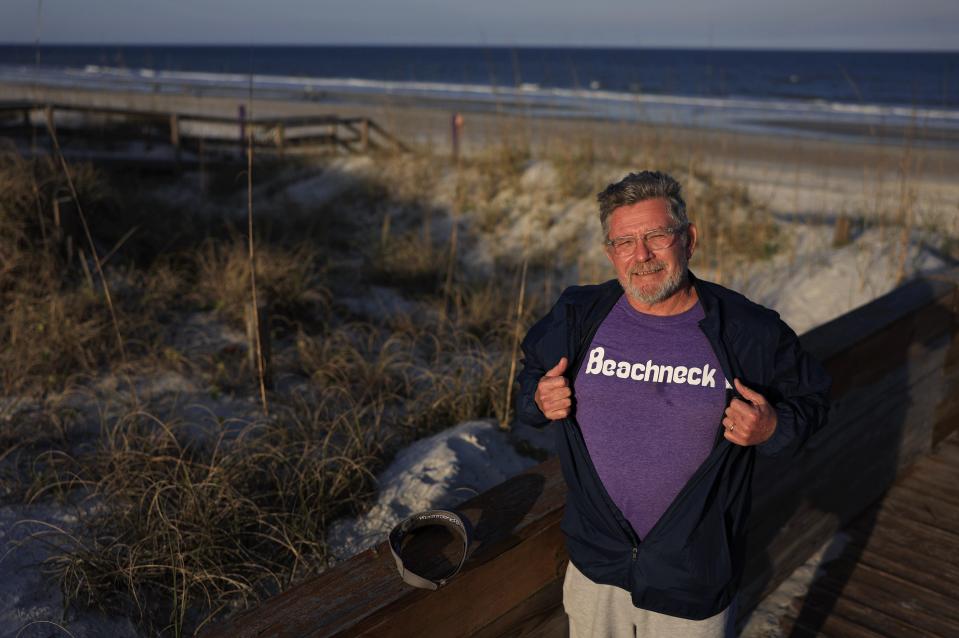
He's a lifetime diver who's dived across the world, from the Great Barrier Reef to the Red Sea. On mornings when he's not out on the sea turtle patrol, he likes to take his stand-up paddle board out and tuck in behind a shrimp boat, watching all the life — including sharks — that trails behind it.
And he gets a kick out of jumping off his paddleboard into a roiling bait ball of mullet and who knows what other larger things are chasing them.
He laughs, recalling a hang glider pilot who, from the air, saw him swimming with the bait and then later tracked him down on the beach.
"He said, 'You're crazy! Man, there were things all over that place!' And I said, 'Yeah, well that's why you do it.'"
This article originally appeared on Florida Times-Union: Jacksonville beaches teacher, coach preserves dunes, saves sea turtles

